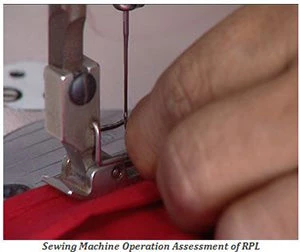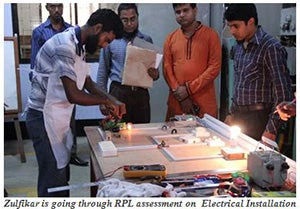
Sweety, Liza, Asad, Zulfikar and many others like them had a common dream – to have good careers and let their families have a better life. Realization of that dream should have been simple – incomes that matched their accumulation of skills and years of job experience. They however, found this hard to achieve because they did not have accreditation that could assure prospective employers that they could actually deliver. What was needed – for both sides in the employee-employer relationship – was a mechanism to open the pathway to professional empowerment. That mechanism came about in the form of the Recognition of Prior Learning (RPL) policy of the Government of Bangladesh. Sweety, Liza, Asad and Zulfikar can now proclaim to the world – openly and without reservation – that they possess skills and expertise certified by the Bangladesh Technical Education Board (BTEB).
 Skills-development not only depends on the education system, it is also influenced by the demand of the job market and economic condition. It is a common practice among employers in Bangladesh to employ unskilled personnel at low wages and to train them on the job. These employees gain experience and skill over the years, their productivity to the employers increase correspondingly, but their salaries and wages remain comparatively low. Without certification of their higher job skills, the employees have limited opportunities to migrate to jobs that offer wages that are comparable to their skill levels. In this way theirs become a story of lifelong struggle against an exploitation that may not have been intended in the first place.
Skills-development not only depends on the education system, it is also influenced by the demand of the job market and economic condition. It is a common practice among employers in Bangladesh to employ unskilled personnel at low wages and to train them on the job. These employees gain experience and skill over the years, their productivity to the employers increase correspondingly, but their salaries and wages remain comparatively low. Without certification of their higher job skills, the employees have limited opportunities to migrate to jobs that offer wages that are comparable to their skill levels. In this way theirs become a story of lifelong struggle against an exploitation that may not have been intended in the first place.
The RPL initiative of the Government was introduced through the Skills and Training Enhancement Project (STEP), being implemented with financial assistance of USD 100 million from the World Bank and the Canadian Government. Started in 2009, STEP is helping to improve the quality of training and the employability of trainees in around 150 public and private technical and vocational education and training institutions. Accompanied with confidence, passion and self-motivation RPL certified workers are applying for better jobs – including in the global workplace.

The occupations/trades that are currently certified by RPL are (i) Electrical Installation and Maintenance (Civil Construction); (ii) Block, Boutique and Screen Printing; (iii) Sewing Machine Operation; (iv) Tailoring and Dress Making; (v) Motorcycle Servicing; and (vi) Plumbing. BTEB plans to introduce additional occupations and trades that the labour market may demand in the future. The assessors are from both industries as well as institutions. RPL candidates are required to undergo three days of assessment. The first two days are for training and orientation to let the candidates know about the examination process, time management, importance of ensuring quality of services and products, etc. Through this training, confidence of the candidates increases to face the RPL assessment on the third day.



Join the Conversation